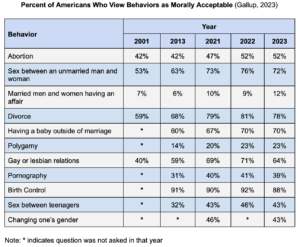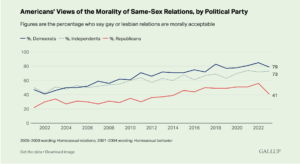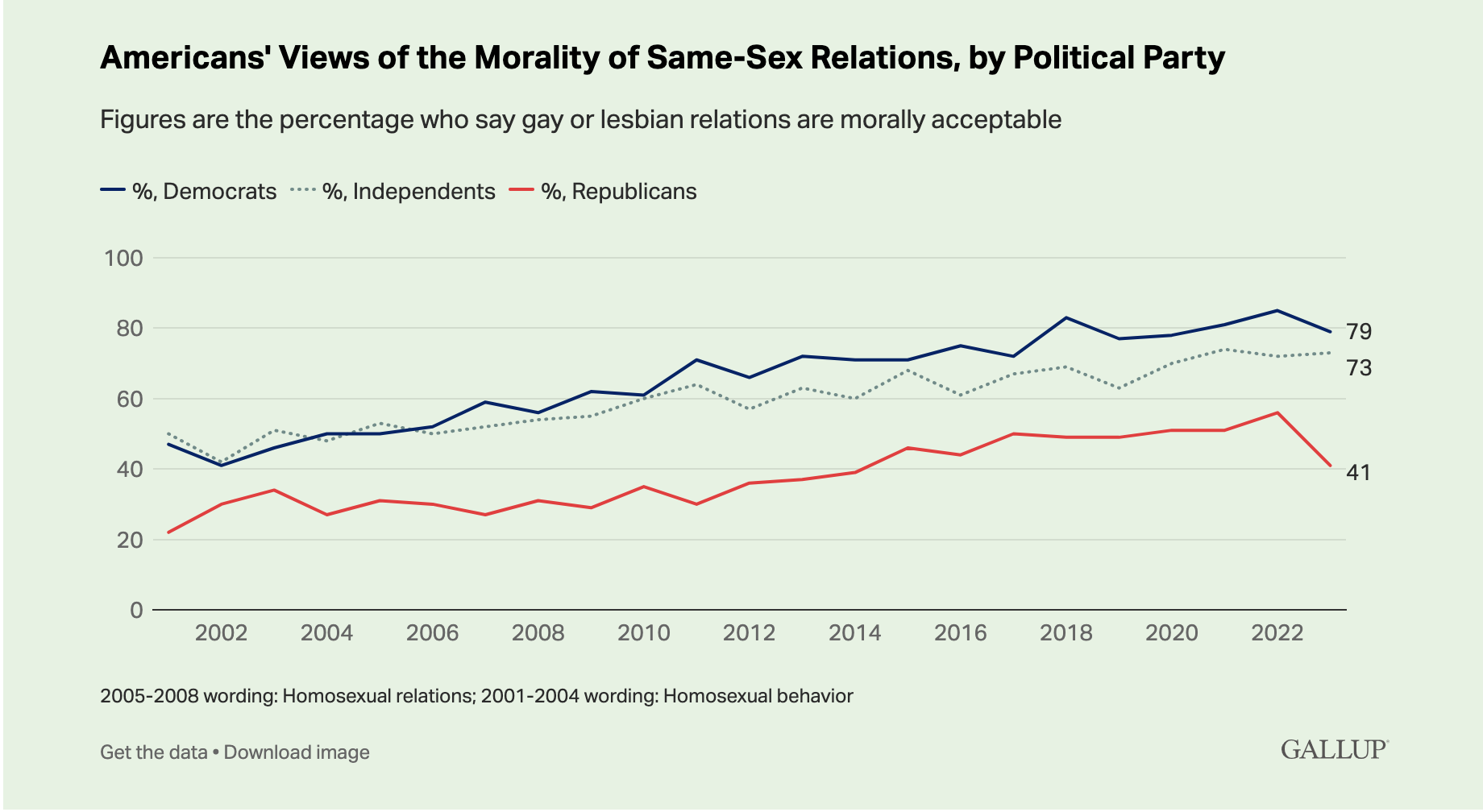Where Americans’ Views on Sexual Morality Stand in 2023
December 6, 2023 by Emily Mendelson
Since 2001, Gallup has been collecting data every month to assess public opinion on a variety of issues. In order to conduct their Social Series interviews (i.e., their process of monthly data collection), researchers call a minimum of 1,000 American adults and ask them interview questions by phone, with the sample weighted to match the overall U.S. population in terms of gender, age, race, and other key demographic factors. Each May, the focus of these interviews is on Values and Beliefs, which include moral attitudes toward a variety of sexual behaviors. You can read the full report of their findings here, but I took a closer look at the data for this post to provide insight into how attitudes toward sex have changed from 2001 to 2023.
The table below represents the percentage of individuals polled who believe that each behavior is morally acceptable at different points in time. We included columns for 2023, 2022, and 2021 to demonstrate change in attitudes over the past three years of data collection. We also included 2013 to provide a reference point for attitudes ten years ago. Lastly, we included 2001, the first year the survey was conducted, for a reference point from 20+ years ago.

From 2001 to 2022, Americans’ sexual attitudes and values generally became more liberal across the board. This year, however, bucked the trend. We won’t know until next year whether this was a temporary blip or the sign of a stable trend, but the results point to a reversion in some sexual attitudes.
One of the most surprising results from this year’s survey is that attitudes toward the acceptability of gay and lesbian relations has actually decreased by seven percentage points since 2022. This is an alarming backslide in public opinion that reflects growing political backlash to LGBTQ+ rights. After two decades of Supreme Court decisions that rapidly expanded rights for LGBTQ+ persons (including the overturning of sodomy laws, extending the right to same-sex marriage, and providing some protection from discrimination), some erosion has begun. For example, earlier this year in the case 303 Creative LLC v. Elenis, 21-476, the Court ruled that non-discrimination laws protecting LGBTQ+ people can’t be enforced for business that provide “expressive services.”
A further breakdown of the data reveals that this trend is largely a reflection of a drop in Republican support. The graphic below from Gallup indicates that just 41% of Republicans today believe that gay and lesbian relations are morally acceptable, which is down 15 percentage points (from 56%) in the last year. That’s a sizable drop in a short period of time. Although there was a slight decrease among Democrats as well, that one is small enough to be within the margin of error. Dr. Lehmiller predicted that this moral divide between political parties would deepen in last year’s post about the Gallup Values and Beliefs survey, and that appears to be happening. Quickly.

Image credit: Gallup, 2023
Beyond attitudes toward gay and lesbian relations, the moral acceptability of sex between an unmarried man and woman, divorce, pornography, birth control, sex between teenagers, and changing one’s gender also decreased from last year, although the shifts were small. Taken together, however, they are not surprising in light of broader political trends that include growing restrictions on birth control, access to pornography, and access to gender-affirming care.
Similar to previous years, a majority of Americans today believe that sex between teenagers and pornography are morally unacceptable. However, the moral acceptability of these two behaviors has still risen by 11% and 8% in the past ten years, respectively. This overall trend may be reflective of how common these behaviors are; after all, most people have sex as teenagers and most people use porn at some point.
The moral acceptability of abortion, having a baby outside of marriage, and polygamy (a form of consensual-non monogamy) stayed the same from 2022 to 2023.
The only behavior that saw an increase in moral acceptability in the past year is married men and women having an affair (also known as non-consensual non-monogamy, or cheating). Although Americans overwhelmingly disapprove of infidelity, the number who say it is morally acceptable has actually doubled in the last decade (going from 6% to 12%). This trend might be tied to the increased popularity of open relationships among Americans, despite the fact that cheating is antithetical to the principals of consensually non-monogamous relationships (if you need advice on how to talk to a partner about opening your relationship, we recommend listening to this podcast episode).
Although moral beliefs about sexual behaviors remain more liberal than they were 20 years ago, the results from the past three years of Gallup surveys suggest that things have started moving in the opposite direction. Although we can’t predict the future, these results suggest that the partisan divide over beliefs regarding sex, gender, and reproduction is likely to further widen in the coming years and that political debates over LGBTQ+ rights, reproductive freedom, and sexual autonomy will only become more heated.
Want to learn more about Sex and Psychology? Click here for more from the blog or here to listen to the podcast. Follow Sex and Psychology on Facebook, Twitter (@JustinLehmiller), or Reddit to receive updates. You can also follow Dr. Lehmiller on YouTube and Instagram.

Dr. Justin Lehmiller
Founder & Owner of Sex and PsychologyDr. Justin Lehmiller is a social psychologist and Research Fellow at The Kinsey Institute. He runs the Sex and Psychology blog and podcast and is author of the popular book Tell Me What You Want. Dr. Lehmiller is an award-winning educator, and a prolific researcher who has published more than 50 academic works.
Read full bio >


